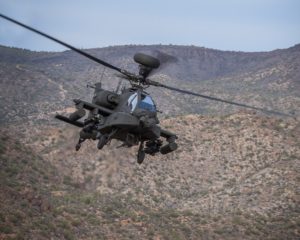NASHVILLE, Tenn. — The leader of the Army’s aviation center of excellence said Monday he doesn’t see plans right now for an F-model of the Apache attack helicopter, while noting the service is committed to upgrading its fleet of enduring aircraft while it pursues Future Vertical Lift platforms.
“Will there be an F-model Apache? I don’t see that necessarily right now. Will we do targeted modernization of all those fleets over time as funding becomes available? Yes,” Maj. Gen. David Francis, who also serves as commanding general of Fort Rucker, told reporters at the Army Aviation Association of America annual conference here.

Francis noted the Army is still working through fielding the AH-64E Version 6, which he said is “is the most modern attack helicopter that we have.”
“As we pursue Future Vertical Lift, we’re walking that tightrope of how much targeted modernization we do to the enduring fleet, Black Hawk, Apache and Chinook, while we simultaneously go after Future Vertical Lift. Those will be constant things where I think there will be tension there. There always will be. But we have to maintain the enduring fleet to be capable of operating in a multi-domain environment while we do Future Vertical Lift,” Francis said.
Boeing, which builds the Apache, has noted the AH-64E is slated to be in production until at least 2028 and has described the Version 6 aircraft as “a network-centric, fully integrated weapon system specifically built to dominate in highly contested and complex battle space.”
Maj. Gen. Walter Rugen, director of the Army’s Future Vertical Lift Cross Functional Team, noted the overarching FVL strategy directed by Congress and the Office of the Secretary of Defense established a series of five capability sets (CAPSET), with the Navy set to potentially lead pursuit of a future heavy attack capability
“Different services have been put in charge of different CAPSETs and CAPSET II is the Navy CAPSET. And that would be a capability that might substantiate heavy attack capability. So we’re waiting and watching the Navy progress on CAPSET II,” Rugen said.